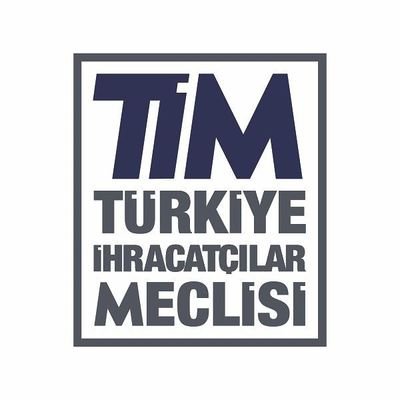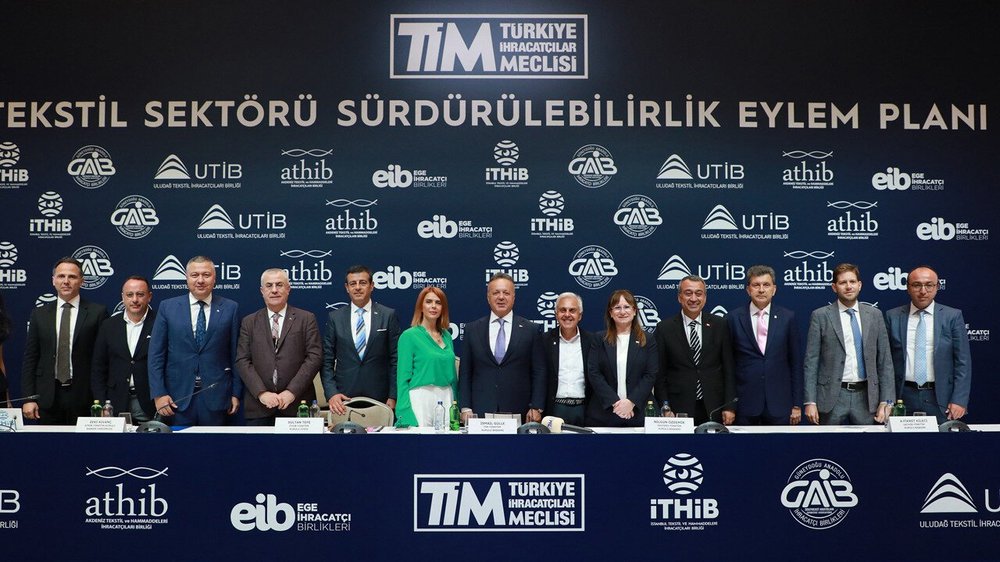The Turkish Textile Sector Sustainability Action Plan was announced by Textile and Raw Materials Exporters’ Associations under the leadership of Turkish Exporters Assembly (TİM).
With the action plan, the Turkish textile industry aims to further increase its market share in global exports by providing a permanent transformation and complying with the European Green Agreement norms at a high level.
TİM Chairman İsmail Gülle said, “I invite all our industrialists, manufacturers, suppliers, and exporters to a production approach that prioritizes nature and the environment. Let us renew the old infrastructure of our factories, separate the infrastructure of washing and dyeing water, recycle the washing water, expand the technologies that use less water in washing and dyeing, reduce the share of fossil fuels in production as much as possible.
The textile sector, which exported an all-time high of $6.2 billion in the first half of the year and is the fifth-largest exporter of the world, has moved to be a pioneer in sustainability. The details of the action plan, prepared by the Textile and Raw Materials Exporters’ Associations under the leadership of the Turkish Exporters Assembly (TİM) to spread the ‘sustainable textile’ vision throughout the sector, were announced.
With its action plan, the Turkish textile industry aims to further increase its market share in global exports by providing a permanent transformation and complying with the European Green Agreement norms at a high level. Within the scope of the plan, the textile sector will take concrete steps on many important issues such as wastewater recovery, reducing the energy consumption of the sector, recycling.
“The greatest legacy we will leave to our future generations is a clean world”
TİM Chairman İsmail Gülle, who gave the opening speech at the ‘Textile Sector Sustainability Action Plan’ meeting, said, “In recent weeks, within the scope of the Sustainability Action Plan consisting of 12 main items, we have announced the message “We produce for the world without consuming the world” and we have encountered a lot of interest. One of the goals we have announced is to create sectoral action plans.
Today, in textiles, which is our leading sector, I am very happy to see the first response of this step and congratulate our sector on this visionary move. Hopefully, this move, led by our textile sector, will encourage all our exporter sectors and our sectoral roadmaps will be completed as soon as possible. Our Sustainability in Industry Science Board will take a critical responsibility in the green transformation process by guiding our sectors in determining and implementing sustainable policies in the industry.
In addition, we are commissioning the Green Line within ALO TİM. Our companies will receive the answers to their questions about green transformation on an industry-by-sector basis from our expert teams under the roof of TİM and Union. It is always harder to be a pioneer, to be first in a field. Our textile and raw materials sector became our first sector to take the action within the framework of our sustainability action plan with a great vision today.
By fulfilling the objectives in our action plan one by one, we will make Türkiye a brand country in the sustainability field. I invite all our industrialists, manufacturers, suppliers, and exporters to a production approach that prioritizes nature and the environment. Let us renew the old infrastructure of our factories, separate the infrastructure of washing and dyeing water, recycle the washing water, expand the technologies that use less water in washing and dyeing, reduce the share of fossil fuels in production as much as possible. The greatest legacy we will leave to our children, our future generations, is a clean world, a clean atmosphere. It is incumbent upon all of us.”
“We should see sustainability as an opportunity, not a risk”
Speaking at the meeting, Ahmet Öksüz, chairman of the Board of Directors of the İstanbul Textile and Raw Materials Exporters Association (İTHİB), stated that the Turkish textile sector is the 5th largest exporter in the world and the 2nd largest exporter of the EU and that the sector must write new success stories to further increase the global forces of the sector in today’s rapidly increasing competitiveness. Öksüz continued: “With the ‘Textile Sector Sustainability Action Plan’ which we have carried out under the leadership of our Turkish Exporters Assembly, we aim to spread sustainability to the base in our sector by carrying out concrete projects in cooperation with our ministries on many issues and to be a pioneer in this regard as well as being a pioneer in exports. We should see the phenomenon of sustainability as a transformation process, not a risk, and consider it an opportunity.”
Expressing his expectations from the Ministries of Commerce, Agriculture, and Forestry at the meeting, Öksüz said, “These goals can only be achieved with the common vision of public-private cooperation. With our Ministry of Agriculture and Forestry, we are working to increase cotton premium difference support and increase production areas to further promote organic cotton production. We are making initiatives with our Ministry of Commerce to establish a separate support mechanism on the sustainability policies of our sector. The difficulty in importing recycled textile products with raw material quality does not match the approach of our sector. The import of clothing products used for recycling within the framework of our sector’s zero-waste approach and sustainability vision needs to be facilitated by the supervision and control of our Ministry of Commerce in a way that does not disturb the domestic market dynamics.”
“Environmentally friendly sustainable production is not a choice but a necessity”
Emphasizing that a very important breakthrough has been made to increase sustainability awareness in Türkiye and to prepare the ground for future applications, Zeki Kıvanç, Head of Textiles and Raw Materials Sector of TİM Sectors Council, said, “Textile and Apparel Sector is one of the largest and most important industries in the world in terms of production and workforce. Undoubtedly, it will continue to be important for human life in the future with its constantly evolving functions and increasingly different uses.” Kıvanç continued, “A sustainable world will be one of the most important priorities of the coming period.
At this point, not only the United States and the European Union, but nearly all around the world are preparing an all-out fight against the negative effects of climate change. Issues such as circular economy, resource efficiency, digital transformation, and carbon footprint will be one of the topics we will talk about the most in the coming period. Environmentally friendly sustainable production is not a choice but a necessity for our Türkiye and our world. The Textile Sector Sustainability Action Plan is of great importance to improve the technical capacity of The Turkish industry on cleaner production methods and benefits and increase the level of awareness. The sustainability action plan we have prepared to protect our competitiveness and to create more and longer-lasting added value are very important.”
Stating that the action plan will accelerate the adaptation process of the sector to the European Green Agreement and increase its market share in global trade, president of the Raw Materials Exporters Association, Ahmet Fikret Kileci, said, “There is a risk that our exporter sectors, such as textiles, which use electricity intensively during the production process, will be caught in the carbon barrier in EU exports. The decarbonization of these sectors is of great importance in terms of maintaining the level of international competition.
Therefore, Türkiye needs to move to a production model with low carbon density as soon as possible and shape its economy within this framework. It should be noted that this transformation; should not be seen as a necessity, but as an opportunity for sustainable development. Our country can create important opportunities such as green technology investments and sustainable finance models in the technology and finance sector, which will become stronger with the decarbonization process in production.
R&D and innovation activities in this field can be accelerated by taking advantage of the funding opportunity to be given within the framework of the ‘European Green Agreement’. As producers and exporters, we are the main actors in the implementation of this sustainable order. In this sense, I would like to make it clear that we will do our part as representatives of the real sector.
Due to our high effectiveness in the field, the roadmap to be created within the framework of the action plan will come to life with our exporter. I would like to thank those who contributed to the sustainability action plan launched in the textile sector, especially our Turkish Exporters Assembly.”
Explaining the details of the ‘Textile Sector Sustainability Action Plan’, TİM Women’s Council Vice President and Textile Sector Sustainability Committee Chairman Sultan Tepe said, “A Sustainability Platform will be established to implement the Textile Sector Sustainability Action Plan. Subcommittees will be established within the platform.
It will be ensured that sustainable raw material initiatives and R&D studies are carried out in terms of raw materials and products, and incentive studies will be carried out for the use of certified materials in production and the development of these resources. Efforts will be made to further encourage organic cotton production. In the title of sustainable supply chain management, projects will be developed with international stakeholders to support traceability and facilitate transparency in the textile supply chain. Within the scope of circularity, cooperation studies will be planned with local governments and brands within the scope of collection, separation, recovery, and recycling of textile wastes.
Initiatives will be initiated for the implementation of the Textile Recycling Center Project.” Expressing that climate studies will enable scientific carbon footprint measurement and reporting and pilot practices in institutions to be put into practice, Tepe said, “A road map to reduce carbon emissions will be prepared. Attempts will be made to create financial resources to minimize water and energy consumption in paint shops and other businesses. Finally, under the heading of corporate social responsibility, projects will be developed to minimize occupational health and safety risks and to increase the employment rate of female employees.
İTHİB Vice Chairman of the Board of Directors Fatih Bilici stated in his speech that the Turkish textile industry will continue to make one of the most important contributions to the Turkish brand, exports, and added value with its sustainability action plan. Bilici continued his words as follows: “Within the scope of the action plan, spreading the exemplary works of our sector in the field of sustainability, raising awareness in our sector in the field of zero waste, energy consumption and circular economy, raising the brand perception of the Turkish textile industry, which is building a sustainable future, all over the world, and national and global funded projects are among our top priorities. Thus, we aim to increase the sustainability vision of our industry and to reach higher levels in global exports.”
Turan Göksan, Vice Chairman of the Board of Aegean Textile and Raw Materials Exporters’ Association, said, “For the Turkish textile industry to maintain its place in the global system and rise to higher ranks, it is of great importance that it has production and sales processes that are easily adaptable to developments in the world, that are transparent and that feel responsible for the future of our world, and that it acts by this transformation. With the action plan, our industry will develop projects on sustainability, increasing its competitive advantage and finding the opportunity to carry production to future generations.”





















